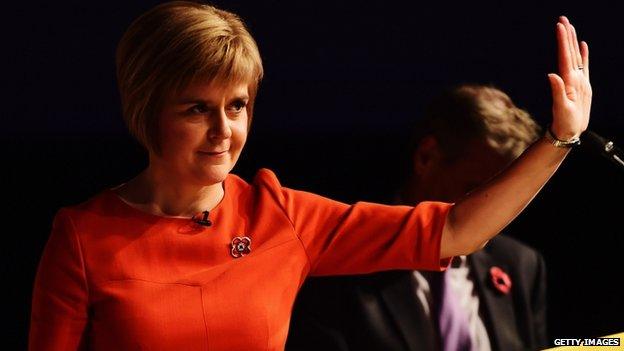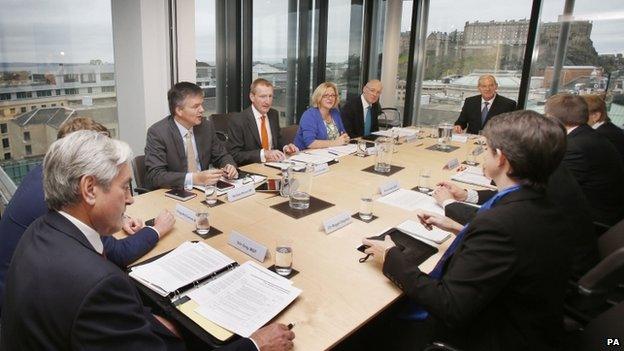Smith Commission: It's about more than tax
- Published

Nicola Sturgeon believes Holyrood to should have the right to call for a referendum
In pondering the Smith Commission, most of the attention has, entirely reasonably, focused upon the tax powers which might be devolved to Holyrood.
On that, it still seems likely that income tax will be devolved entirely - perhaps tied in with other powers which might assist economic development to answer the point that a broader basket than tax alone would be beneficial.
Less attention has been paid to other matters. The first Smith plenary discussed the issue of governance in general terms. There was, apparently, very broad agreement, although detail is different.
Administrative scrutiny of Holyrood elections has already been devolved under the provisions of the Scotland Act 2012. Which begs the question: should the power to hold any future referendum also be devolved?
Nicola Sturgeon, the incoming First Minister, has told me today that she believes it should. She argues that Holyrood should be responsible for such matters and that, consequently, she believes the power should be transferred.
Temporary power
Remember a few concomitant points here. The power to call the September referendum was transferred to Scotland under the terms of the Edinburgh Agreement between the Prime Minister and the First Minister. Nicola Sturgeon negotiated those terms with Michael Moore, then Scottish Secretary.
But that power was temporary. For one referendum only, held on a single date, with a single question. That power has now lapsed. Ms Sturgeon wants it restored permanently.

Lord Smith has met with representatives from Scotland political parties
But, intriguingly, she argues that any future referendum - and she is not, to be plain, envisaging an instant rerun - should, if possible, still be subject to agreement between Edinburgh and London.
That would, she argues, give the outcome international legitimacy, helping to facilitate any negotiations with, for example, the European Union.
In essence, she appears to envisage some form of Edinburgh Agreement in reverse - with Holyrood instigating a move to hold a future referendum, with Holyrood holding the power but with Westminster asked to offer endorsement.
To be clear, again, this is about a potential referendum. This is about formal powers. This is not a suggestion by Ms Sturgeon, in and of itself, that she has a timetable in mind.
Deal breaker?
There is a third point to bear in mind. It is very likely - indeed, certain - that the pro-Union parties giving evidence to Smith, the nominees, will seek to thwart Ms Sturgeon's aim.
They believe that the constitution should remain firmly reserved to Westminster as in the founding Scotland Act 1998. That, consequently, the power to hold a plebiscite on the future of the Union and Scotland's place therein should also remain formally reserved.
Do I believe the Union parties will adhere to that stance? I do. Do I believe this will be a deal breaker in Smith?
I do not. I believe, again, that the SNP will seek to obtain the maximum possible from Smith - retaining the option to invite the people to cast a verdict at the subsequent UK General Election in May next year.